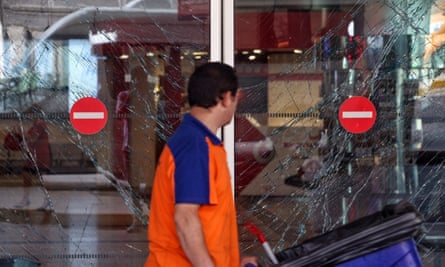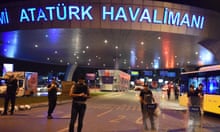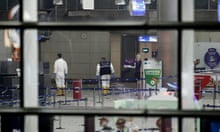Turkey has declared a day of national mourning after more than 40 people were killed in suicide attacks on Istanbul’s main airport, the deadliest and most high-profile in a string of killings and explosions that have shaken the country this year.
The violence has crippled Turkey’s tourism industry and threatens its ambitions as a global hub, as the violence in neighbouring Syria increasingly spills over into a country that once promoted itself as a stable base in a restive region.
President Recep Tayyip Erdoğan blamed Islamic State for the late-night attack on one of the busiest air travel hubs in the world, and called on the international community to make the attack a turning point in the global fight against terrorism.
At least three people with guns and suicide vests targeted the arrivals and departures areas, where they sprayed travellers with bullets and then detonated their explosives in a rampage that lasted just a few minutes but killed dozens and injured more than 250 others.
The official death toll rose to 42 on Wednesday night, according to the Turkish state-run news agency Anadolu, which reported that an injured woman had died in hospital.
Police sources quoted in the Turkish media said the attackers had rented a flat in the Aksaray area of Istanbul and taken a taxi at 8.45pm local time to Atatürk airport. The driver described the attackers as calm and not at all stressed.
According to Turkish officials, the attackers were initially unable to enter the terminal building. “When the terrorists couldn’t pass the regular security system, when they couldn’t pass the scanners, police and security controls, they returned and took their weapons out of their suitcases and opened fire at random at the security check,” said prime minister Binali Yildirim.
Two Turkish officials told Associated Press that one of the three attackers entered the lower-level arrivals hall, opened fire, and then detonated his explosive.
In the ensuing chaos, the second assailant went up to the departure hall where he blew himself up. The third man waited outside and detonated his explosives as terrified passengers flooded out of the airport, the officials said.
Among the dead identified so far were 23 Turks. Six Saudis, two Iraqis, an Iranian, a Chinese national, a Jordanian, a Tunisian, an Uzbek and a Ukrainian were also killed in the attack, Turkish officials said.
Five of the Turkish dead were policemen, and others were tourism guides waiting for clients in the arrivals area, two who worked in ground services, and at least one taxi driver.
Although there has been no claim of responsibility, analysts and US counter-terrorism officials – including CIA director John Brennan – also said the choice of target and method of the attack bore hallmarks of Isis, which earlier this year bombed an airport and metro in Brussels, targeted Paris last year, and has been blamed for several attacks on Turkey in the past year.
The latest attack drew pledges of support from leaders around the world, with Russia announcing it had eased travel restrictions and trade sanctions, and Israel promising unity in the fight against terrorism.
Intelligence officials are now poring over video evidence and witness statements for clues about the suicide cell, which a senior prosecutor said may have included foreign militants.
Video footage showed one gunman tumbling to the ground, apparently felled by a police bullet, as passengers and airport workers scattered. Seconds later he detonated an explosive vest.
“It’s a jigsaw puzzle … The authorities are going through CCTV footage [and] witness statements,” a Turkish official told Reuters.

Terrified passengers told how they had crouched behind check-in desks, tried to hide in airport shops and raced back towards planes minutes after disembarking, as panic swept through the airport.
Steven Nabil, a journalist passing through Istanbul on the way back from his honeymoon, said: “We were sitting ducks, waiting to find out who will open the door. I was looking desperately for anything sharp to protect her [his wife] if they opened the door and took hostages.”
We were transiting from our honeymoon tonight through #istanbul back to NYC when the bullets were closer i hugged and kissed her
— Steven nabil (@stevoiraq) June 28, 2016
He decided to try to use a kettle of boiling water to throw at anyone who opened the door, in an attempt to buy his wife time to run. “Longest 45 minutes ever … when the bullets were closer I hugged and kissed her,” he wrote.
Many survivors said that as they waited for rescue, they searched online for news of the attack and hoped that they might make it out alive.
“Literally while we were hiding out … some local guy was showing us video footage on his phone of what was going on 200 metres away, which was surreal,” Rihards Kalnins, a Latvian businessman, told AFP.
“People started saying there was an explosion, there was gunfire. There was no order. Then for the next few hours the only way to find out what was going on was through social media.”
One barista, who wanted to remain anonymous, said he had been hiding, together with 14 coffeeshop customers, in the café’s small storeroom during the attack that unfolded only a few metres away.
“I hurried all the people inside the little room and we were hiding there, waiting until someone came to help us. We were there for maybe 45 minutes; it was very scary,” he said.
The company had sent in a psychologist, he added, but everyone was back at work on Wednesday despite the trauma. “I am used to it,” he shrugged. “It’s not my first Isis attack. I was on Istiklal street a few months ago when that guy blew himself up.”
The airport is packed around the clock with Turks who have been abroad, travellers streaming into Istanbul for work and holidays, and many more on stopovers for journeys across Asia, Africa and the Middle East.
Beyond the human cost, the violence is likely to be a devastating blow for an economy heavily reliant on tourism, which is already suffering from falling visitor numbers after a string of attacks. In just over a year, 17 attacks have killed more than 300 people, many of them in Istanbul.
For Turkey itself the devastation of a key airport could be a push to take stronger action against Isis. It joined the US-led coalition fighting the terrorist group and has allowed its Incirlik airbase to be used for bombing raids, but has not joined the sorties itself.
In December, a blast at the city’s other main international airport killed a cleaner, injured another and damaged several planes. In January a suicide bomber killed a dozen German visitors in the heart of the tourist district. And two months later a bombing on the city’s main shopping street, also blamed on Isis, killed three Israelis and an Iranian.
Tourism industry workers had been hoping for a boost from the Eid festival that marks the end of Ramadan, after a period of relative calm, but say security worries hit business within hours.
“With Eid coming up, business has just started to pick up again as well. But now we are finished,” said Abdulbakir Demir, 42, sitting in front of a tour agency office and gesturing at hotels and shops selling tourist curios.
“All of these will have to close down. This morning our Eid reservations went down to 30%. People keep calling to cancel their holidays.”
Russia’s decision to lift restrictions on package tourism and trade sanctions, which had been imposed after Turkey shot down a Russian fighter jet in November, may provide some hope to the faltering sector.
The two countries had began moving towards a rapprochement after Erdoğan wrote to Putin on Monday expressing regret for the incident, though stopping short of a full apology.
“I ask that the Russian government begins the process of normalising general trade and economic ties with Turkey,” Putin told government ministers in televised comments reported by AFP. “I want to start with the question of tourism.”
Erdoğan has also been rebuilding ties with Israel after six years of animosity, and on Tuesday signed a reconciliation pact and agreed to restore full diplomatic relations.
Israel’s president, Reuven Rivlin, told Erdoğan the new deal would help both countries fight terrorism. “Our strengthened dialogue will greatly aid in our joint efforts against this threat,” Rivlin said in a letter of condolence. “It sends a strong message to the terrorists that we will stand united against hatred.”
On Wednesday authorities in Istanbul moved quickly to try and limit damage from the bombing, reopening the airport within hours, stringing a vast Turkish flag across the bomb site as workers raced to repair damage and calling for a stronger global coalition against terror.
Barely 24 hours after the bloody attack it was almost business as usual at the airport. But one employee of the private security company guarding Atatürk airport expressed anger that he and his colleagues had been sent back to work so soon after the attack.
“In Brussels they closed down the airport for several days after the attack,” said the man, who declined to give his name. “Here they reopened immediately, as if nothing has happened. It’s all about profit for them.”
He added: “I was guarding the door when those guys came in. We all ran. It was awful. Many of the policemen were hiding also. The attackers had chosen the hour just after iftar [the meal ending the Ramadan fast], so they were all caught unawares.”
Both he and his colleague said they were pessimistic about Turkey, and desperate to leave. “Most of our colleagues have college degrees but could not find a job. If I could, I would leave Turkey tomorrow,” he added.
Another security guard, however, was more defiant. “Of course we all came back to work today. This is what our job is all about. We have to stand up stronger.”
On the ground in Istanbul, as flights in and out of Atatürk slowly resumed, other locals pledged not to let the attack disrupt their lives.
One cargo plane pilot whose plane was waiting on the tarmac to take off during the attacks, said he refused to be afraid: “That is what they want, isn’t it? But we will carry on and not let them scare us.”







